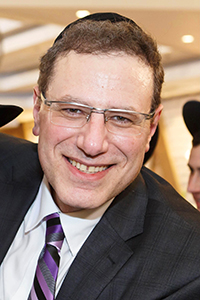Thursday, September 14, 2023
Surviving Against the Odds: A Rabbi's Life-Saving Care by Good Samaritan Hospital
Late on the night of July 7, 2023, Reuven Stengel, a 52-year-old rabbi and Judaism educator for MEOR Upstate at Binghamton and Cornell University, returned to his home in Pomona, New York, after a lengthy car ride. Upon arriving, he noticed a slight numbness in his right leg but dismissed it, took some over-the-counter pain relief and went to sleep.
However, before long, he began experiencing difficulty breathing, feeling as though he couldn't get enough air into his lungs. Within moments, his face turned purple and he collapsed. Acting swiftly, his wife, Esther Stengel, dialed 911, and just a few minutes later, a Rockland County Hatzoloh EMS ambulance arrived at their doorstep.
 |
| Rabbi Reuven Stengel |
The paramedics placed him on his front lawn, intubated him and administered shocks until they successfully revived his pulse. After reaching Good Samaritan Hospital’s emergency department, a CT scan revealed Rabbi Stengel had suffered a massive pulmonary embolism — a sudden blockage in the pulmonary arteries, the blood vessels that send blood to the lungs.
The emergency room staff ordered blood thinners and a thrombolytic, or clot-dissolving, agent to stabilize him and prevent further clotting and complications. “It all happened so quickly,” Rabbi Stengel remarked. “I wouldn’t be alive if I was home alone that night.”
Robin Kim, MD, medical director of the emergency department at Good Samaritan Hospital explained, “When traveling long distances or sitting still in a confined space for an extended period of time, as Rabbi Stengel did, a blood clot can form in a deep vein, usually in the leg, which is called deep venous thrombosis. This is extremely serious because, if a clot or part of a clot breaks off and travels to your lungs, you can suffer a pulmonary embolism. If it’s not treated quickly, it can cause life-threatening complications.”
That night, Rabbi Stengel’s life was saved thanks to the hard work of Dr. Kim, his nurses Kim Sgandura and Jobesh Thomas and the brave volunteers from Rockland Hatzoloh EMS — Chaim Millman, David Levene, Mendy Reisman, C.J. Lederer, Shia Brach and Mordy Schwab.
Today, Rabbi Stengel is recuperating at home, enjoying time with his wife and their eight children. His pain is steadily improving, he’s started walking every day to regain his strength and he will soon be able to return to teaching. Rabbi Stengel expressed his immense gratitude to his care team: “Everything worked out for me to survive, and I’m very thankful to the emergency doctors and nurses at Good Samaritan Hospital for the outstanding care they provided.”
Typically, after a pulmonary embolism, there is some degree of damage to the heart or brain; however, remarkably, Rabbi Stengel's heart and brain are functioning well. Dr. Kim commented, “In all my years of experience, outcomes like this are exceedingly rare. These are the stories that make it all worthwhile.”
Learn more about emergency services at Good Samaritan Hospital.